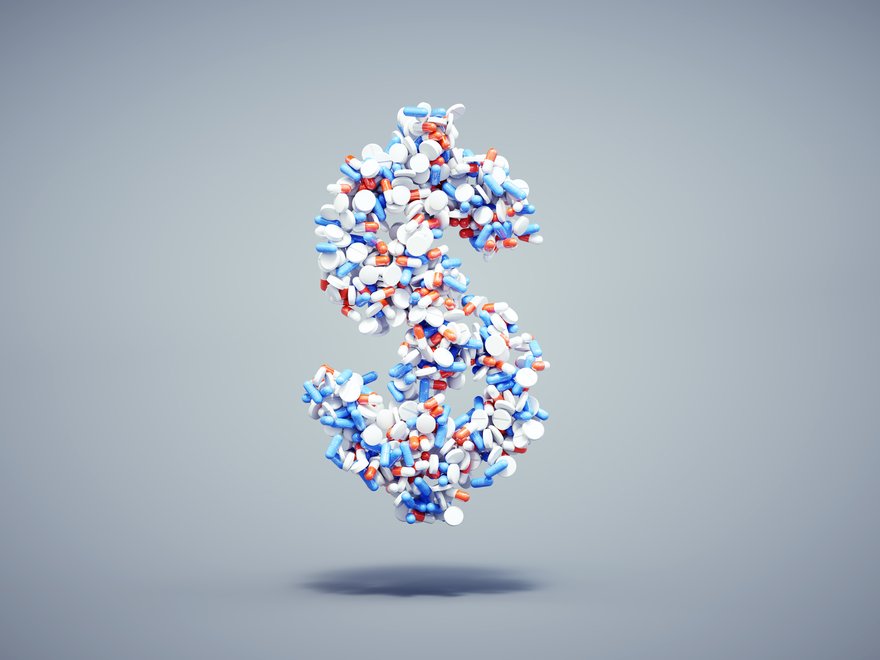The global pharmaceutical industry tops $1.2 trillion in sales each year. This huge sector improves the quality of life for many people while creating attractive opportunities for long-term investors. The COVID-19 pandemic has attracted even more attention to pharmaceutical companies developing coronavirus drug and vaccine candidates.
Before you invest in pharmaceutical companies, find out some top picks and learn how to choose the best stocks in the pharmaceutical sector.

Four great pharmaceutical stocks to buy right now
Here are some top pharmaceutical stocks for investors to consider:
| Company | 2022 Revenue | 2022 Earnings |
|---|---|---|
| AbbVie (NYSE:ABBV) | $58.1 billion | $11.8 billion |
| Bristol Myers Squibb (NYSE:BMY) | $46.2 billion | $6.3 billion |
| Johnson & Johnson (NYSE:JNJ) | $94.9 billion | $17.9 billion |
| Pfizer (NYSE:PFE) | $100.3 billion | $31.4 billion |
1. AbbVie
AbbVie’s top-selling blockbuster drug -- defined as one that generates more than $1 billion in annual sales -- is the rheumatoid arthritis treatment Humira. Although sales from Humira are expected to decline in 2023 when AbbVie's patent for the drug expires, the drugmaker’s portfolio also includes several other products with strong sales performances.
Blood cancer drug Venclexta continues to perform well. The company also expects to profit significantly from its anti-inflammatory drugs Rinvoq and Skyrizi. AbbVie projects combined risk-adjusted sales for the two drugs of $15 billion in 2025.
AbbVie’s pipeline includes 20 different programs in phase 3 testing. Most of the candidates target additional approvals for existing drugs. However, the company is also in the late stages of testing promising new candidate drugs to treat blood cancer, Parkinson’s disease, and wet age-related macular degeneration.
Investors also have a lot to like about AbbVie’s dividend. The company belongs to the elite group of stocks called Dividend Achievers that have increased their dividends for at least 25 consecutive years. In just the past five years, AbbVie has increased its dividend by 120%.
2. Bristol Myers Squibb
Bristol Myers Squibb (BMS) makes the blood thinner Eliquis and the cancer drug Opdivo. It acquired the drugmaker Celgene in 2019 to add three more cancer drugs -- Revlimid, Pomalyst, and Abraxane -- to its portfolio.
The Celgene purchase also brought the multiple sclerosis and ulcerative colitis drug Zeposia under BMS’ control. In early 2021, BMS won regulatory approval in the U.S. for the cell therapies Abecma and Breyanzi. It also manufactures Reblozyl, which treats anemia in patients with blood disorders and myelodysplastic syndromes.
BMS is conducting more than 50 clinical testing programs. The company is exploring a combination of the immunotherapies Opdivo and Yervoy for their potential to treat additional types of cancer. It is also testing several new cancer immunotherapies.
BMS has increased its annual dividend for 13 consecutive years. Its dividend payout has jumped by more than 38% in the past five years.
3. Johnson & Johnson
Johnson & Johnson is a healthcare giant that derives the majority of its growth from its pharmaceutical business. J&J boasts a large product lineup that includes immunology drugs Stelara and Tremfya and cancer drugs Darzalex and Erleada.
The company’s pipeline features more than 50 late-stage clinical testing programs. These clinical trials are testing new drug candidates and seeking additional approvals for drugs such as Darzalex and Imbruvica, which treat cancer.
Johnson & Johnson plans to spin off its consumer health unit into a standalone entity in 2023. This will leave the company with its two fastest-growing segments -- pharmaceutical and medical devices.
J&J ranks as a Dividend King, having raised its annual dividend for 59 consecutive years. Investors don’t have to worry about the dividend with the spinoff of the company’s consumer health business, though. J&J expects that its dividend, combined with the anticipated dividend from the new entity, will remain at least at the same level as before the transaction completes.
4. Pfizer
Pfizer markets several blockbuster products. These include cancer drugs Ibrance and Xtandi, blood thinner Eliquis (which Pfizer co-markets with Bristol Myers Squibb), and Prevnar pneumococcal vaccines.
However, Pfizer is probably best known for Comirnaty, its COVID-19 vaccine developed with BioNTech (BNTX 0.58%). The vaccine was the first to win Emergency Use Authorization and full approval from the U.S. Food and Drug Administration (FDA). Pfizer’s COVID-19 pill Paxlovid is also poised to be a huge moneymaker, with projected sales of at least $22 billion in 2022.
The drugmaker is conducting late-stage tests or awaiting regulatory approval for more than 30 clinical programs. Its vaccine candidate for the respiratory syncytial virus looks especially promising.
Pfizer has long been a favorite among income-seeking investors. The company has paid a quarterly dividend for more than 83 years. Over the past five years, Pfizer has increased its dividend by 25%.
Choosing the best pharmaceutical stocks
The top pharma companies have a few key characteristics in common. Knowing what to look for can help you identify the best investments.
The leading pharmaceutical companies generally increase their revenue and earnings on a consistent basis. Pharma companies must always contend with expiring patents and increasing competition, but the best companies have robust drug pipelines that more than offset any decreases in existing revenue streams.
The strength of a drug company's pipeline is perhaps the most important factor. Although pharmaceutical companies have many drugs in various stages of development, most companies only publicize the development of a drug when it advances to clinical testing in humans or is awaiting regulatory approval.
Some clinical trials test new drugs, while others test existing drugs for new uses. The best pharmaceutical companies are adept at both developing new therapies and using existing drugs for new purposes.
The average cost of developing a new drug is $2.6 billion. The average elapsed time between drug discovery and regulatory approval is 10 years. But the payoff for developing an effective treatment, especially for a common ailment, can be massive. Owning an important patent can generate significant profits for a pharmaceutical company for many years, with little or no competition from other drugmakers.
Risks of owning pharmaceutical stocks
The significant cost and long elapsed time between drug discovery and approval (assuming the drug development process succeeds and regulatory approval is granted) makes investing in pharmaceutical stocks relatively risky.
Consider these risk factors before investing in any pharmaceutical companies:
- Potential for clinical failure: Early-stage drug candidates are especially likely to fail, meaning they are proven to be unsafe or ineffective in clinical trials. Even drug candidates in phase 3 testing can ultimately fail.
- Potential failure to win regulatory approval: Even drug candidates that successfully complete clinical testing may fail to win approval from the relevant regulatory agencies.
- Non-reimbursement risks: To achieve commercial success for approved drugs, pharma companies must convince institutional payers, such as public and private health insurers, to reimburse patients for the costs of their drugs. Pharmaceutical companies must also contend with pressure from these payers to set drug prices lower than their targets.
- Product liability and litigation potential: The medical risks associated with pharmaceutical drugs expose drugmakers to liability issues. Companies can be forced to recall drugs from the market due to safety concerns, and lawsuits against pharma companies are common.
As in any industry, pharmaceutical companies face competition from other drugmakers. But competition in this sector can be especially fierce because when patents expire, generic drugmakers are able to produce the same drugs much more cheaply.
Related investing topics
Should you invest in pharmaceutical companies?
Since many pharmaceutical companies pay attractive dividends, these types of stocks are well-suited for income-focused investors. Another great reason to consider buying pharmaceutical stocks is that the U.S. population is aging. With the baby boom generation growing older, many more people in coming years are likely to need prescription medications.
Pharmaceutical Stocks FAQs
Are pharmaceutical stocks a good investment?
Since many pharmaceutical companies pay attractive dividends, these types of stocks are well-suited for income-focused investors. However, the significant cost and long elapsed time between drug discovery and approval are what make investing in pharmaceutical stocks relatively risky.








